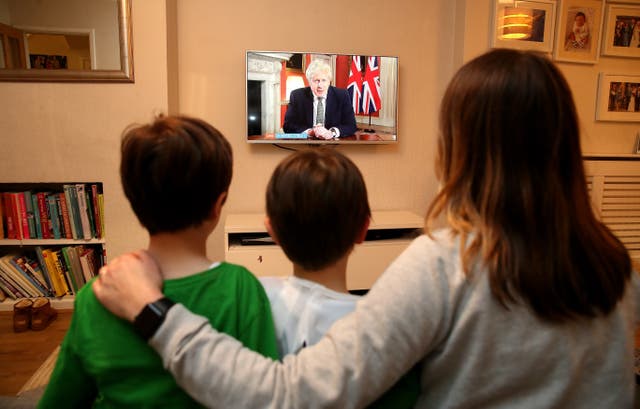PM shuts schools in third national lockdown expected until mid-February
The Prime Minister told the nation to stay indoors other than for limited exceptions.

Boris Johnson has imposed a third national lockdown on England and shut schools to most students to prevent the NHS being overwhelmed by surging coronavirus infections.
In a televised address to the nation on Monday night, the Prime Minister told the nation to stay indoors other than for limited exceptions, with measures expected to last until mid-February.
And the Prime Minister bowed to significant pressure to order primary schools, secondaries and colleges to move to remote teaching for the majority of students from Tuesday.
Mr Johnson said the new variant, which is up to 70% more transmissible, was spreading in a “frustrating and alarming” manner, and warned that the number of Covid patients in English hospitals is 40% higher than the first peak.
“As I speak to you tonight, our hospitals are under more pressure from Covid than at any time since the start of the pandemic,” he said.
Pinning his hopes on the rapid rollout of vaccines to ease restrictions, Mr Johnson acknowledged “how frustrated you are” and that “you have had more than enough of Government guidance” – but stressed “now, more than ever, we must pull together”.
“The weeks ahead will be the hardest yet but I really do believe that we’re entering the last phase of the struggle because with every jab that goes into our arms we’re tilting the odds against Covid and in favour of the British people,” he added.
The lockdown will be brought into law as soon as possible, but Mr Johnson urged the public to follow the rules straight away.
Mr Johnson’s statement came after the chief medical officers for the first time raised the UK to the highest level on the Covid-19 alert system.
They warned the NHS is at risk of being overwhelmed within 21 days “in several areas” without further action.
The restrictions are unlikely to be eased until around 13 million people aged over 70 or classed as clinically extremely vulnerable have received the vaccine and been given enough time to be protected – a period of about two to three weeks after getting the jab.
Strong stay at home messaging will return, with leaving only permitted for limited exceptions such as shopping for necessities including food and medicine.
The public were told to work from home unless it is impossible to do so, such as for critical workers and those in the construction industry.
Exercise will be permitted with household or support bubble members or with one other person from another household, but is advised to be limited to only once per day and carried out locally.
The remaining exceptions to going outside are to seek medical help, provide assistance to a vulnerable person, to receive medical care or to flee a threat of harm.
Non-essential shops will have to close, but early years settings such as nurseries and childminders are allowed to remain open and existing childcare bubbles can stay in place.

Exams will again face disruption as schools close to all those other than for the children of key workers and vulnerable children until after the February half-term. University students will not be allowed to return to their institutions.
Restaurants and other hospitality venues can continue delivery or takeaway services but will no longer be permitted to serve alcohol.
Outdoor gyms, tennis courts and golf courses must close and outdoor team sports will be prohibited.
But Premier League football and other elite sports with testing regimes and bubbles in place will be allowed to continue.
The extremely clinically vulnerable who were previously told to shield should stay at home and only leave for medical appointments and exercise.
The regulations are expected to be laid before Parliament on Tuesday, with MPs retrospectively being given a vote after they are recalled early from the Christmas break on Wednesday.
Mr Johnson briefed his Cabinet on the measures on Monday evening and also spoke to Labour leader Sir Keir Starmer.





